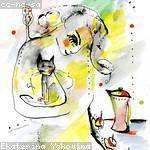"Title
The five (daily) prayers, Friday prayer to the next Friday prayer, and Ramadan to the next Ramadan, are expiation of the sins committed in between them, so long as major sins are avoided
Hadith_Text
Abu Hurayrah (may Allah be pleased with him) reported that the Prophet (may Allah's peace and blessings be upon him) said: ""The five (daily) prayers, and Friday prayer to the next Friday prayer, and Ramadan to the next Ramadan, are expiation of the sins committed in between them, so long as major sins are avoided.""
Explanation
The five daily prayers expiate the sins committed between them except the major sins. Similarly, the sins committed between Friday prayer and the next Friday prayer are expiated apart from major sins, and the same applies to fasting in Ramadan and fasting in the next Ramadan.
Benefits
Observing these duties most properly causes Allah Almighty, out of His grace and mercy, to forgive the minor sins committed in the intervals between them.
Sins are divided into minor and major.
Grade
Sahih/Authentic.
Takhrij
[Muslim]
"
Phát hiện bài viết
Khám phá nội dung hấp dẫn và quan điểm đa dạng trên trang Khám phá của chúng tôi. Khám phá những ý tưởng mới và tham gia vào các cuộc trò chuyện có ý nghĩa
"Title
Allah forgives everything for the martyr except the debt
Hadith_Text
‘AbdullÄh ibn ‘Amr ibn al-‘Ās (may Allah be pleased with him) reported that the Prophet (may Allah's peace and blessings be upon him) said: ""Allah forgives everything for the martyr except the debt."" Another narration for him reads: ""Fighting in the cause of Allah expiates everything except the debt.â€
Explanation
Martyrdom expiates all sins, the minor and the major thereof, except for the debt. Martyrdom does not expiate the debt, and that is due to the greatness of the rights of people, especially those related to properties, which indeed, are the dearest to them. The same applies to anything pertaining to people's rights
— Cảm giác Bưu kiện
"Title
The tooth-stick cleans the mouth and pleases the Lord
Hadith_Text
‘Ā’ishah (may Allah be pleased with her) reported that the Prophet (may Allah's peace and blessings be upon him) said: ""The tooth-stick cleans the mouth and pleases the Lord.""
Explanation
The tooth-stick cleans the mouth from dirt, foul odors and other harmful things. The Sunnah practice of using the tooth-stick is achieved by brushing with anything that cleans the teeth, such as the toothbrush and toothpaste, and any other cleaner. ""Pleases the Lord"" means that brushing the teeth is one of the reasons for Allah's being pleased with a slave.
Using the tooth-stick has many benefits, including that it gives a pleasant smell to the mouth, firms the gums, sharpens the eyesight, removes phlegm, conforms to the Sunnah, delights the angels, pleases the Lord, increases good deeds, and heals the stomach.
Benefits
The tooth-stick is a means for purifying the mouth.
Allah Almighty loves cleanliness and those who purify themselves. So, He legislated for them what helps them win His approval.
It points out the merit of using the tooth-stick.
The Prophet (may Allah’s peace and blessings be upon him) encouraged his Ummah to often use the tooth-stick.
A fasting person may use the tooth-stick whether at the earlier or latter part of the day, given the generality of the Hadīth.
Using the tooth-stick is one of the means whereby one can gain Allah’s pleasure.
It establishes the attribute of contentment for Allah, the Exalted.
Grade
Sahih/Authentic.
Takhrij
[An-Nasaa’i]
"
"Title
The tooth-stick cleans the mouth and pleases the Lord
Hadith_Text
‘Ā’ishah (may Allah be pleased with her) reported that the Prophet (may Allah's peace and blessings be upon him) said: ""The tooth-stick cleans the mouth and pleases the Lord.""
Explanation
The tooth-stick cleans the mouth from dirt, foul odors and other harmful things. The Sunnah practice of using the tooth-stick is achieved by brushing with anything that cleans the teeth, such as the toothbrush and toothpaste, and any other cleaner. ""Pleases the Lord"" means that brushing the teeth is one of the reasons for Allah's being pleased with a slave.
Using the tooth-stick has many benefits, including that it gives a pleasant smell to the mouth, firms the gums, sharpens the eyesight, removes phlegm, conforms to the Sunnah, delights the angels, pleases the Lord, increases good deeds, and heals the stomach.
Benefits
The tooth-stick is a means for purifying the mouth.
Allah Almighty loves cleanliness and those who purify themselves. So, He legislated for them what helps them win His approval.
It points out the merit of using the tooth-stick.
The Prophet (may Allah’s peace and blessings be upon him) encouraged his Ummah to often use the tooth-stick.
A fasting person may use the tooth-stick whether at the earlier or latter part of the day, given the generality of the Hadīth.
Using the tooth-stick is one of the means whereby one can gain Allah’s pleasure.
It establishes the attribute of contentment for Allah, the Exalted.
Grade
Sahih/Authentic.
Takhrij
[An-Nasaa’i]
"
"Title
A man came to the Prophet (may Allah's peace and blessings be upon him) and said: AssalÄmu ‘alaykum. The Prophet responded to his greeting and the man sat down. The Prophet (may Allah's peace and blessings be upon him) said: Ten. Then another man came and said: AssalÄmu ‘alaykum wa rahmatullah. The Prophet replied to his greeting and the man sat down. The Prophet (may Allah's peace and blessings be upon him) said: Twenty
Hadith_Text
‘ImrÄn ibn al-Husayn (may Allah be pleased with him) reported: A man came to the Prophet (may Allah's peace and blessings be upon him) and said: ""AssalÄmu ‘alaykum (Peace be upon you)."" The Prophet responded to his greeting and the man sat down. The Prophet (may Allah's peace and blessings be upon him) said: ‘Ten.’ Then another man came and said: ""AssalÄmu ‘alaykum wa rahmatullÄh (May the peace and mercy of Allah be upon you)."" The Prophet replied to his greeting and the man sat down. Then another man came and said: ""AssalÄmu ‘alaykum wa rahmatullÄh wa barakÄtuh (May the peace, mercy, and blessings of Allah be upon you)."" The Prophet replied to his greeting and the man sat down. The Prophet (may Allah's peace and blessings be upon him) said: ‘Thirty.'""
Explanation
A man came to the Prophet (may Allah's peace and blessings be upon him) and said: ""AssalÄmu ‘alaykum (Peace be upon you)."" The Prophet responded to him and the man sat down. Then the Prophet (may Allah's peace and blessings be upon him) said that that man had obtained ten good deeds. This is the reward earned by anyone says this phrase of the greeting of peace. And Allah may still multiply this if He so wills. Then, someone else came and said: ""AssalÄmu ‘alaykum wa rahmatullÄh (May the peace and mercy of Allah be upon you)."" The Prophet responded to his greeting and the man sat down. Then the Prophet (may Allah's peace and blessings be upon him) said that this man had gained twenty good deeds, as his greeting was longer than the previous one by saying: ""wa rahmatullah (and the mercy of Allah)"". Then, a third man came and said: ""AssalÄmu ‘alaykum wa rahmatullÄh wa barakÄtuh (May the peace, mercy, and blessings of Allah be upon you)."" The Prophet (may Allah's peace and blessings be upon him) responded to him and the man sat down. Then, the Prophet (may Allah's peace and blessings be upon him) said that he had gained thirty good deeds. This last one is the most complete phrase of the Islamic greeting of peace.
Benefits
Grade
Hasan/Sound.
Takhrij
[At-Tirmidhi]
"
"Title
A good vision is from Allah, and a (bad) dream is from the devil
Hadith_Text
Abu QatÄdah (may Allah be pleased with him) reported that the Messenger of Allah (may Allah's peace and blessings be upon him) said: ""A good vision is from Allah, and a (bad) dream is from the devil. If anyone of you sees something which he dislikes, he should spit on his left three times and seek refuge with Allah from the devil
— Cảm giác Bưu kiện
"Title
O Abu Batn, we only go to the market to greet with peace everyone we meet
Hadith_Text
At-Tufayl ibn Ubay ibn Ka‘b reported that he used to visit AbdullÄh ibn ‘Umar (may Allah be pleased with him) in the morning and accompany him to the market. AbdullÄh would offer greetings of peace to every one he met on the way, be they sellers of petty goods, store owners, or poor people. At-Tufayl said: ""One day when I went to AbdullÄh ibn ‘Umar, he asked me to accompany him to the market. I said to him: ""What do you do in the market if you do not sell, nor ask about merchandise, nor offer a price for them, nor you sit in the market gatherings? and said to him: Let us sit here and talk."" He replied: ""O Abu Batn, we only go to the market to greet with peace everyone we meet.""
Explanation
HadÄ«th explanation: At-Tufayl ibn Ubay ibn Ka‘b used to visit ‘AbdullÄh ibn ‘Umar (may Allah be pleased with him) and then go to the market with him. At-Tufayl recounts that when they entered the market, Ibn ‘Umar would greet everyone he passed, whether they were sellers of insignificant or precious goods, the poor, or anyone else. In other words, he would greet everyone he met, young or old, rich or poor, etc.
At-Tufayl says that one day he went to see ‘AbdullÄh ibn ‘Umar and Ibn ‘Umar asked him to accompany him to the market. At-Tufayl asked him why he goes to the market even though he does not sell, buy, ask about merchandise, or barter with the sellers
— Cảm giác Bưu kiện
"Title
This world is a prison for the believer and a paradise for the unbeliever
Hadith_Text
Abu Hurayrah (may Allah be pleased with him) reported that the Messenger of Allah (may Allah's peace and blessings be upon him) said: ""This world is a prison for the believer and a paradise for the unbeliever.""
Explanation
A believer is a prisoner in this world, given the eternal bliss that Allah has prepared for one on the Day of Resurrection. As for the unbelievers, their paradise is their worldly life, given the eternal punishment that Allah has prepared for them on the Day of Resurrection.
Benefits
Grade
Sahih/Authentic.
Takhrij
[Muslim]
"
"Title
Goodness is tied to the forelocks of horses until the Day of Resurrection
Hadith_Text
‘AbdullÄh ibn ‘Umar (may Allah be pleased with him) reported that the Messenger of Allah (may Allah's peace and blessings be upon him) said: ""Goodness is attached to the forelocks of horses until the Day of Resurrection.""
‘Urwah al-BÄriqi (may Allah be pleased with him) reported that the Prophet (may Allah's peace and blessings be upon him) said: ""Goodness is attached to the forelocks of horses until the Day of Resurrection: (in terms of) reward and spoils of war.""
Explanation
Horses are a source of goodness for the believer until the Day of Resurrection. There is a reward for preparing steeds of war to fight in the cause of Allah, and this a deferred reward that will be realized in the Hereafter. And there is an immediate reward which is the spoils of war that the warrior earns from the possessions of the enemy.
Benefits
Grade
Sahih/Authentic.
Takhrij
[Al-Bukhari and Muslim with its two versions]
"
"Title
Paradise is nearer to one of you than his shoelace, and so is Hellfire
Hadith_Text
Ibn Mas‘ūd (may Allah be pleased with him) reported: The Prophet (may Allah's peace and blessings be upon him) said: 'Paradise is nearer to one of you than his shoelace, and so is Hellfire.""
Explanation
The Prophet (may Allah's peace and blessings be upon him) said that Paradise and Hellfire are nearer to a person than the leather strap over his feet, which is so close to him. This is because a person may do an act that pleases Allah not thinking it will earn him a great reward, yet it takes him to the Garden of Bliss. Alternatively, a person may commit a sin to which he does not pay much attention, but it incurs the displeasure of Allah and causes him to sink deeply into Hell-fire for so many years – and he was unaware of that.
Benefits
Good deeds lead to Paradise while sins lead to Hellfire.
Entering Paradise is easy if one has the right intent and do good deeds.
Good deeds and sins can exist in the simplest of things. So, a person should not belittle doing simple pious acts or underestimate doing small evils.
It encourages us to do good deeds, even if they are little, and discourages us from committing evils, no matter how small.
Examples are given to make the intended meaning clearer.
Grade
Sahih/Authentic.
Takhrij
[Al-Bukhari]
"















Ibrahim Abdallah
Xóa nhận xét
Bạn có chắc chắn muốn xóa nhận xét này không?
Karim Malik
Xóa nhận xét
Bạn có chắc chắn muốn xóa nhận xét này không?
WisdomRevelations
Xóa nhận xét
Bạn có chắc chắn muốn xóa nhận xét này không?